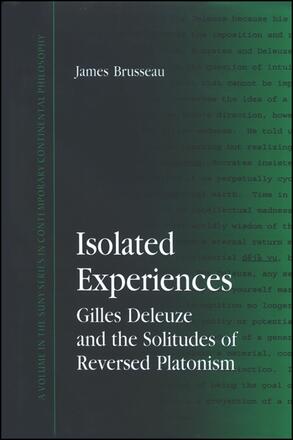
Isolated Experiences
Gilles Deleuze and the Solitudes of Reversed Platonism
Alternative formats available from:
Traversing the genres of philosophy and literature, this book elaborates Deleuze's notion of difference, conceives certain individuals as embodying difference, and applies these conceptions to their writings.
Description
By extending Gilles Deleuze's philosophy through diverse literary tracts, this book develops an account of what it means to be different and enters important contemporary debates about identity and the nature of solitude. At the same time, the book elaborates a limited philosophy. From unusual writings and rare human experiences, James Brusseau forges compelling understandings that scrupulously preserve his subjects' irregularities. The resulting philosophic narrative remains strictly localized; it elucidates narrow bands of experience and refuses broadening generalizations.
The book's first section rigorously elaborates Deleuze's pioneering notion of difference. The second part conceives certain individuals as embodying difference and then employs the conception to elude difficulties blocking recent work on subjectivity. Part three combines insights from the first two parts with Isabelle Eberhardt's North African travel journals. In Eberhardt, Brusseau finds sexualities and a solitude that only Deleuze's unique notion of difference can explain.
An energetic interaction between philosophy and literature drives this book. Brusseau weaves back and forth between the genres, engaging diverse literatures not only to embody but also to refine his philosophic positions. The literary authors he discusses range from Shakespeare and Fitzgerald to Borges, Bataille, and Eberhardt.
James Brusseau teaches in the Graduate Division of the Faculty of Philosophy and Letters at the Mexican National University, Mexico City
Reviews
"Brusseau has written a book on Deleuze which will be a milestone in the field. Even those who know Deleuze well are often obliged to do somersaults in order to negotiate the rough terrain of his rhizomatic writing. Brusseau seems to have negotiated this terrain effortlessly. His scholarship is impeccable, his choice of models and illustrations by means of which to shed light on difficult points is unfailing, his understanding of Deleuze's thought is excellent. The result is a book on Deleuze which mobilizes and elucidates his thought in a way comparable to the best of the available commentaries and explications. " -- Constantin V. Boundas, Trent University
"Isolated Experiences is essentially an exploration of significant themes in Deleuze's thought, especially during the period of Difference and Repetition and Logic of Sense. I like the author's use of examples from literature and other philosophical works. He captures the spirit of many Deleuzian concepts--and of their relationship--through the examples he uses. The use he makes of Fitzgerald and Eberhardt comes to mind as particularly helpful. Throughout he is clear, and indeed helped me come to see some aspects of Deleuze's thought I had previously missed. " -- Todd May, Clemson University